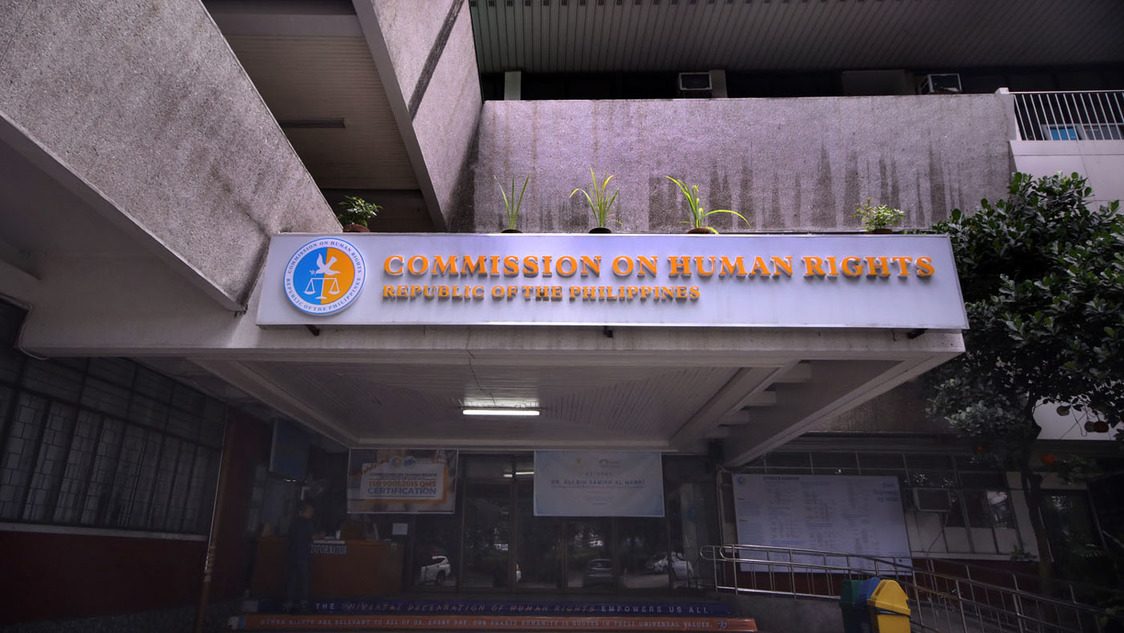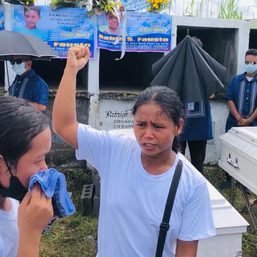SUMMARY
This is AI generated summarization, which may have errors. For context, always refer to the full article.


MANILA, Philippines – The Commission on Human Rights (CHR) is in a tricky position where its leadership will be appointed by President Ferdinand Marcos Jr., the son and namesake of the deposed leader whose administration, marred by violence and abuse, led to the creation of the commission itself.
CHR was established through the 1987 Philippine Constitution in response to the atrocities that happened during the first Marcos presidency. Thousands were abducted, detained, tortured, and killed during Martial Law, considered as one of the darkest periods in Philippine history.
Marcos has yet to name the new members of the CHR en banc that will lead the country’s national human rights institution for seven years. The term of the previous en banc – chaired by Chito Gascon until his death in October 2021 – ended on May 5, 2022.
The next CHR leadership will undoubtedly face several challenges, including ensuring justice for the thousands of victims under the previous administration’s war on drugs and the impact of the demonization of human rights by former president Rodrigo Duterte.
The 1987 Philippine Constitution only states that the CHR en banc – composed of a chairperson and four commissioners – must be natural-born citizens of the Philippines and majority should be lawyers. They do not go through the Commission on Appointments.
Human rights advocates are waiting with bated breath on who will lead the CHR and if it will be as independent as the embattled commission under Gascon. According to PhilRights executive director Nymia Pimentel-Simbulan, “the work of CHR en banc is more urgent than ever.”
Rappler asked several advocates and organizations to list down five characteristics or qualities the incoming CHR commissioners should possess that would enable them to address these pressing issues in the Philippines.
Here’s a table containing the groups’ full answers.
1. Should be genuine human rights defenders with proven track record
A person who seeks to lead CHR should have a solid track record that shows he or she is genuine in wanting to protect Filipinos against human rights violations, mostly by the state.
“It is important that those who will be appointed in the CHR en banc should be genuine people’s rights and human rights defenders with proven record of and competence in the advocacy and defense of human rights,” Karapatan secretary-general Cristina Palabay told Rappler.
For PhilRights' Simbulan, the ideal CHR commissioner "ideally" should be an "NGO worker who has consistently stood for the rights and interests of the vulnerable sectors; should 'walk the talk.'"
"[They should have] wide-ranging knowledge and understanding of human rights concepts, principles, and approaches as evidenced by their educational background and training, practice," she said.
Meaning, aspiring CHR commissioners should not have previously supported policies that led to what is referred to as the “worst human rights crisis” under Duterte, including the violent war on drugs. They should have openly expressed opposition to the violence and bloody trail caused by the campaign, especially as the commission is the foremost institution investigating the abuses.
As of April 22, 2022, CHR has investigated at least 3,813 incidents of drug-related extrajudicial killings since 2016, which has led them to file or refer administrative or criminal cases to appropriate agencies, including courts and the Office of the Ombudsman, among others.
The new commissioners should also commit to protecting human rights defenders and oppose the rampant red-tagging that Duterte cultivated under his watch. The previous CHR en banc, in a July 2020 report, tagged the then-president Duterte as having created a "dangerous fiction" that made the Philippine dangerous for human rights defenders.
The new CHR should carry on with this work calling out such moves from the government, as well as oppose efforts to reimpose the death penalty and other policies that go against existing international principles that the Philippines is a signatory to.
“[They should have] articulated and demonstrated a consistent stand against death penalty, extrajudicial killings, red-tagging, sexism, and misogyny,” LILAK, a collective for indigenous women's rights, said.
2. Should be assertive with its mandate and have ‘unflinching’ independence
CHR is an independent commission, meaning it functions to fulfill its mandate without being influenced by the rest of the government. This is important because CHR is expected, among others, to investigate abuses committed by the state.
We’ve seen how independence on the part of CHR played out under the Duterte administration. The commission, despite being sidelined and openly threatened by Duterte himself, was still able to call out the numerous violations and even investigate many incidents in the past six years.
The new set of CHR commissioners should continue to have this “unflinching independence,” according to National Union of Peoples' Lawyers president Edre Olalia. They should have “no ties that bind, not beholden to the appointing authority, government or any interest except to the human rights victims and defenders.”
Women’s rights group GABRIELA, meanwhile, said the new CHR should not be intimidated and pressured by powers that be in the government.
Karapatan also said the commission should be able to assert its independence “especially from government and military intervention and to strengthen its role in the investigation of violations of civil, political, economic, social and cultural rights.”
3. Should have right understanding of justice and accountability
Justice and accountability are key concepts that are aligned with the mandate of CHR, especially in the aftermath of the Duterte administration where thousands of drug war victims and their families are yet to find closure.
The new commissioners should have a vision molded by an understanding of how important their roles are in giving justice to those who are unable to attain it through other ways. CHR, after all, is usually the last resort of many.
“Kailangan may pangil ang CHR dahil ang Pilipinas ay sumasailalim sa siklo ng human rights violations na walang karampatang hustisya,” Katribu Youth said, adding that the commission should also make sure to consistently investigate, or at the very least call out the Marcos administration despite being led by the person who appointed them.
(CHR should be more aggressive especially now that we’re under a cycle of human rights violations with no justice in sight.)
Accountability and transparency are also important in terms of how CHR deals with its investigations, according to Ryan Silverio of the ASEAN SOGIE Caucus.
“[It should be] dedicated to setting up measures to ensure that concerns brought to the commission are acted upon, and progress is conveyed to stakeholders,” he told Rappler.

4. Should have clear principles and not fall into trap of disinformation
The new leaders of CHR should not fall into the trap of disinformation, nor should they have actively engaged in disinformation prior to being appointed.
This is very important not just because CHR continues to be a victim itself of “fake news,” but because President Marcos and his family themselves have benefited from a massive network of disinformation propaganda even before the campaign period for the 2022 elections.
LILAK said the new commissioners and chairperson of CHR should “have a clear sense of history, respect facts, and reject lies and disinformation.”
As an independent body created in response to the atrocities of Martial Law, the incoming CHR commissioners should contribute to the preservation of history amid rampant efforts to erase it.
5. Should have willingness to engage with different communities and civil society
It is very important for the incoming CHR leadership to be very willing to continue engaging with different communities and other members of civil society in the Philippines. As the country’s national human rights institution, the new commissioners should ensure that their engagement will be inclusive as well as be very open to collaboration.
Katribu Youth told Rappler that CHR should hold consultations with community leaders to gauge the realities on the ground, in addition to being open to communication.
“Alam nila, hindi lang sa pamamagitan ng pagbabasa, ang hirap na danas ng bawat indibidwal sa aspeto ng edukasyon, pangkalusugan, lupa, trabaho at demokratikong karapatan,” Katribu Youth said.
“Kung sila ay para sa karapatang pantao ng mamamayan, kailangan aktibo silang nakikilahok sa kanilang pang araw-araw na buhay,” the group added.
(They should know the hardships and challenges faced by every individual in the aspect of education, health, land, jobs, and other democratic rights. If they are for human rights, they should be actively engaging in the cause every day.) – Rappler.com
Add a comment
How does this make you feel?


















![[Just Saying] SONA 2024: Some disturbing points](https://www.rappler.com/tachyon/2024/07/TL-marcos-sona-points-july-23-2024.jpg?resize=257%2C257&crop=335px%2C0px%2C720px%2C720px)

There are no comments yet. Add your comment to start the conversation.